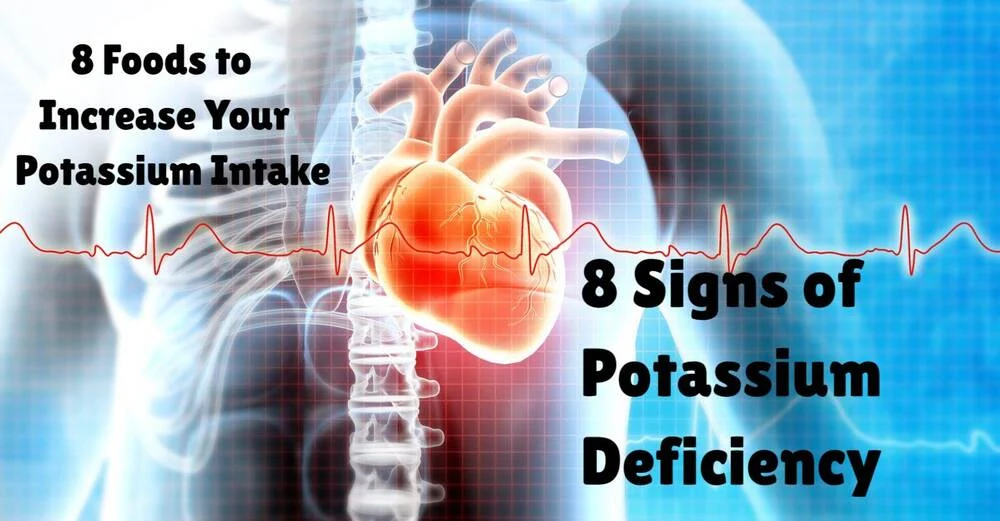Potassium is one of the most important minerals for overall health, yet it’s often overlooked. While bananas are the classic source, many other foods provide a substantial potassium boost.
As both a macromineral and electrolyte, potassium carries an electric charge essential for nerve signals, muscle contractions, and cellular processes. It helps move nutrients into cells, remove waste, and maintain a healthy heart rhythm.
When potassium levels drop too low (hypokalemia), several noticeable symptoms may appear. Below, we explore eight key signs of potassium deficiency and foods that can help restore healthy potassium levels naturally.
8 Signs of Potassium Deficiency
1. Abdominal Cramps and Bloating
Potassium supports the smooth muscles in the digestive tract. Low levels can disrupt normal digestive activity, causing cramps, bloating, or general discomfort.
2. Constipation
Irregular bowel movements are another common symptom. Both insufficient and excessive potassium can interfere with healthy digestion, so maintaining a balance is crucial.
3. Fatigue and Weakness
Potassium affects every cell in the body. Low potassium can reduce energy production, leaving you feeling tired, weak, or lethargic even after adequate sleep.
4. Brain Fog
Potassium is essential for proper brain function. A deficiency may cause mental fatigue, confusion, and difficulty concentrating.
5. Skin Issues
Chronic low potassium may contribute to dry skin, acne, or other skin problems because potassium is vital for cellular health and fluid balance.
6. Increased Thirst and Frequent Urination
Potassium helps regulate fluid balance. Low potassium levels can impair kidney function, leading to dehydration symptoms like frequent urination and excessive thirst.
7. Heart Palpitations
Potassium plays a key role in maintaining a healthy heart rhythm. Deficiency can cause irregular heartbeats or palpitations, which should be monitored carefully.
8. Ringing in the Ears (Tinnitus)
Although less common, potassium deficiency may contribute to ear ringing, often related to its effects on blood pressure and heart rhythm.
Top Foods to Boost Potassium Intake
Diet is the main factor behind potassium deficiency. Here are eight potassium-rich foods to include in your meals:
1. Yams
Yams are starchy tubers that provide roughly 19% of the daily value (DV) per cup (136g). They can be baked, boiled, or roasted and come in white, yellow, purple, or pink varieties.
2. Potatoes and Sweet Potatoes
A medium sweet potato contains about 541 mg of potassium, while a cup of mashed sweet potato offers 16% DV. Regular potatoes are also excellent sources of potassium, fiber, and complex carbohydrates.
3. Bananas
One medium banana contains around 422 mg of potassium (~9% DV), along with vitamins B6, C, and antioxidants, making them a quick and convenient option.
4. Dried Fruits
Dried apricots, prunes, raisins, and figs are concentrated potassium sources. Half a cup of dried apricots provides 16% DV, while a full cup can exceed 1,500 mg. They’re perfect as snacks or in trail mixes.
5. Tomato Products
Tomato paste, sun-dried tomatoes, sauces, and juices are potassium-rich. For example, 3 tablespoons of tomato paste provide about 486 mg, while a cup of sun-dried tomatoes can contain over 1,800 mg. Tomatoes are also rich in antioxidants like lycopene.
6. Seafood
Clams, salmon, tuna, cod, and haddock are excellent potassium sources. 100g of clams contain roughly 534 mg of potassium, plus protein, iron, selenium, and omega-3s.
7. Beans and Legumes
White beans, black beans, kidney beans, lentils, and chickpeas are potassium powerhouses. One cup of white beans contains 21% DV, black beans 17%, and lentils 15%. They’re also high in protein and fiber.
8. Leafy Greens
Spinach, Swiss chard, kale, and other greens offer substantial potassium—cooked spinach has over 800 mg per cup, Swiss chard around 1,000 mg (~20% DV). They’re also rich in vitamins A, K, magnesium, and fiber, while being low in calories.
How to Identify and Correct Potassium Deficiency
Processed foods often contain high sodium but low potassium, increasing the risk of deficiency. Eating potassium-rich foods regularly can restore balance. Symptoms like cramps, fatigue, constipation, or brain fog should not be ignored. Consult a healthcare professional for a blood test if needed.
By prioritizing whole, natural foods, you can maintain optimal potassium levels, support heart, muscle, and brain health, and improve overall well-being.
Frequently Asked Questions (FAQ) about Potassium
What are the main signs of potassium deficiency?
Common signs include fatigue, muscle cramps, constipation, brain fog, heart palpitations, increased thirst, and in some cases, ringing in the ears.
How much potassium should I eat daily?
Adults generally need around 2,500–3,000 mg of potassium per day. Specific needs may vary based on age, sex, and health conditions.
Can I get enough potassium from food alone?
Yes, most people can meet their potassium needs through a balanced diet rich in fruits, vegetables, legumes, potatoes, and seafood.
What are the best high-potassium foods for vegetarians?
Leafy greens, beans, lentils, sweet potatoes, yams, bananas, dried fruits, and tomato products are excellent plant-based sources of potassium.
Is potassium deficiency dangerous?
Yes, severe potassium deficiency can lead to serious health issues such as irregular heartbeats, muscle weakness, and fatigue. It’s important to maintain adequate potassium levels through diet or supplements if necessary.
References
- Healthline. Potassium Deficiency: 8 Symptoms, Causes & Food Sources. Accessed December 2025.
- Healthline. How Much Potassium Do You Need Per Day?. Accessed December 2025.
- Healthline. 16 Foods That Are Extremely High in Potassium. Accessed December 2025.
Note: All potassium values are approximate and may vary depending on preparation methods and specific food varieties.

Comments